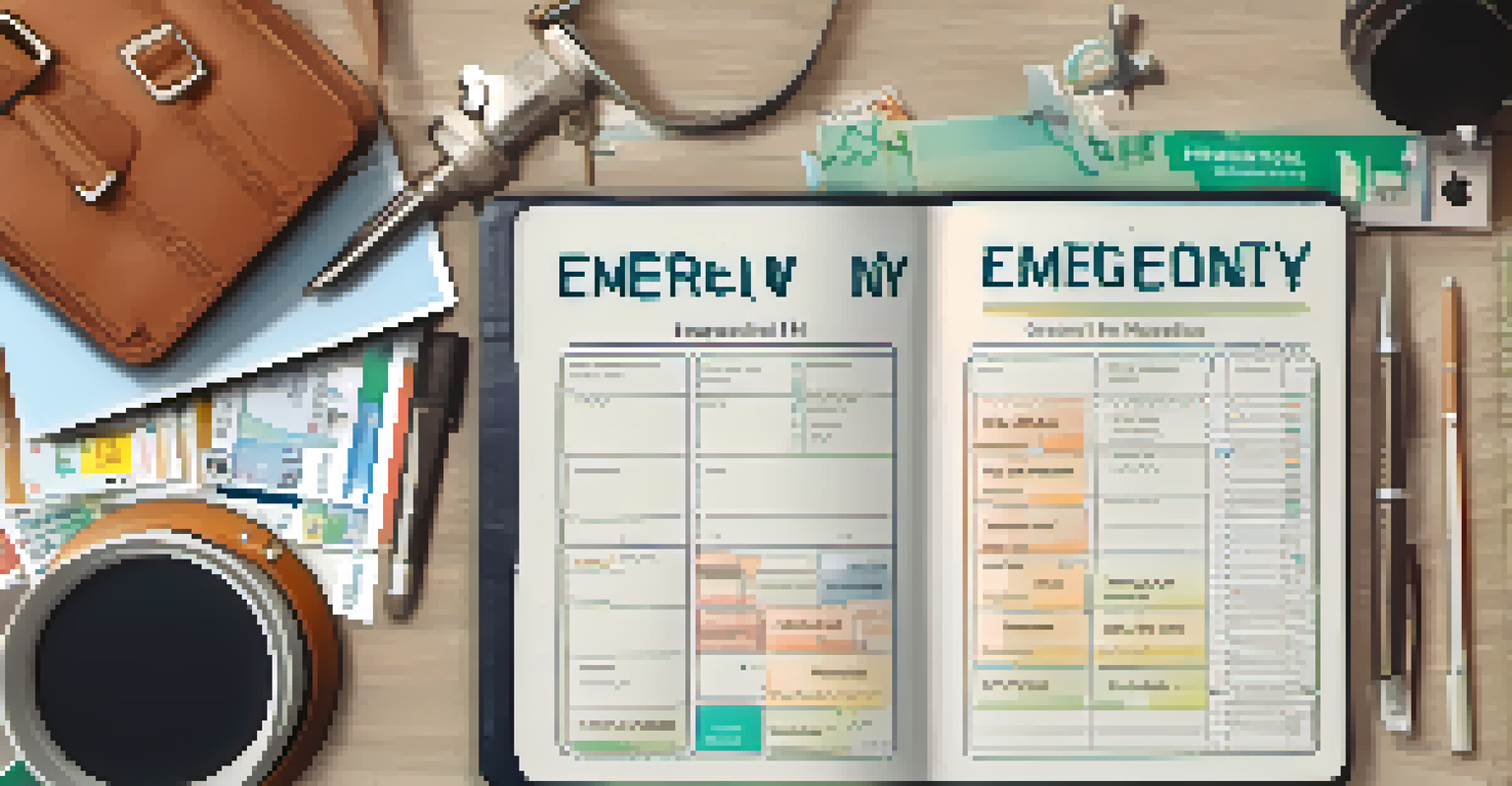The Importance of Emergency Funds in Travel Budgeting

Understanding Emergency Funds and Their Role in Travel
An emergency fund is a financial safety net set aside for unexpected expenses, and when it comes to travel, it’s no different. Imagine planning a dream vacation only to have your plans derailed by a sudden illness or a car breakdown. Having an emergency fund means you can handle these surprises without ruining your travel experience or piling on debt.
A budget is telling your money where to go instead of wondering where it went.
Think of it as a cushion that allows you to enjoy your trip without constantly worrying about what might go wrong. You can explore new places, try local cuisines, and engage in spontaneous adventures, all while knowing you have a backup plan. This peace of mind can enhance your overall travel experience, making it more enjoyable and memorable.
Furthermore, an emergency fund can also cover unforeseen costs related to travel, such as a last-minute flight change or accommodation adjustments. With this financial buffer, you can make decisions that prioritize your health and safety without the stress of financial strain.
How Much Should You Save for Travel Emergencies?
Determining the right amount for your emergency fund can feel daunting, but a good rule of thumb is to set aside 10-20% of your total travel budget. For instance, if you're planning a $2,000 trip, aim for $200 to $400 as your emergency fund. This amount can vary based on your destination, the length of your trip, and your personal comfort level.

It’s wise to consider factors such as the cost of living in your travel destination and the types of activities you’ll be doing. For example, if you’re heading to a remote area or a location with limited medical facilities, you might want to increase your emergency fund. This extra cushion can provide greater peace of mind as you navigate unfamiliar environments.
Emergency Funds Enhance Travel Joy
Having an emergency fund allows travelers to explore freely, knowing they are financially prepared for unexpected challenges.
Remember, the goal of your emergency fund is to prepare for the unexpected, so it’s better to err on the side of caution. By saving a little extra, you can ensure that you’re well-prepared for any situation that may arise during your travels.
Common Travel Emergencies and How to Prepare
Travel emergencies can range from minor inconveniences to major crises, and being prepared for them is essential. Common issues include lost luggage, illness, or even natural disasters that may disrupt your plans. By anticipating these scenarios, you can create a more comprehensive travel budget that includes your emergency fund.
The future belongs to those who prepare for it today.
For example, if your luggage gets lost, having funds set aside for essentials like clothing and toiletries can make a world of difference. Similarly, if you fall ill, access to funds can help cover medical expenses or a last-minute flight home. Preparing for these possibilities allows you to navigate challenges with greater confidence.
Additionally, consider investing in travel insurance as part of your emergency planning. This can provide an extra layer of protection, covering unexpected events and giving you peace of mind while you travel.
How to Build Your Travel Emergency Fund
Building your emergency fund doesn’t have to be overwhelming; it can be done gradually. Start by setting a specific savings goal based on your travel budget and timeline. For instance, if you plan to travel in six months, divide your target amount by that timeframe to determine how much you need to save each month.
Automating your savings can make this process easier. Set up a separate savings account for your travel emergency fund and automate transfers from your primary account. This way, you won’t even notice the money is gone, and before you know it, your safety net will be growing steadily.
Save 10-20% for Travel Emergencies
Setting aside 10-20% of your travel budget for emergencies helps ensure you're ready for unforeseen expenses.
Also, consider cutting back on non-essential expenses in your daily life to boost your savings. Small changes, like making coffee at home or dining out less frequently, can add up quickly and help you reach your goal faster.
The Peace of Mind That Comes with an Emergency Fund
One of the greatest benefits of having an emergency fund for travel is the peace of mind it provides. Knowing that you have a financial safety net allows you to focus on enjoying your trip instead of worrying about potential mishaps. This mental clarity can enhance your overall travel experience, making it more fulfilling.
Imagine standing on a beautiful beach, soaking up the sun, and feeling completely at ease because you know you’re prepared for anything. That sense of security can lead to deeper relaxation and more memorable moments, allowing you to fully immerse yourself in your surroundings.
Furthermore, this peace of mind can foster a more adventurous spirit. When you know you have a backup plan, you may be more inclined to try new things, whether it’s tasting street food or hiking a challenging trail, ultimately leading to richer travel experiences.
Using Your Emergency Fund Wisely While Traveling
While an emergency fund is there for unexpected situations, it’s important to use it wisely. Only tap into this fund for genuine emergencies, such as medical issues or significant travel disruptions. This discipline ensures that your fund remains intact for when you truly need it.
For example, if you encounter a minor inconvenience, like needing to buy a cheap souvenir that isn't essential, it’s better to cover that from your regular spending money. In contrast, if a more serious issue arises, like needing to pay for a last-minute flight due to a family emergency, your emergency fund is there to support you.
Use Your Fund Wisely on Trips
It's crucial to reserve your emergency fund for genuine emergencies, maintaining its integrity for when it’s truly needed.
Staying mindful of your spending can help you stretch your budget further. Keep track of your expenses during your trip, and use your emergency fund only when necessary. This approach allows you to enjoy your travels without compromising your financial safety net.
Conclusion: Make Emergency Funds a Travel Priority
In conclusion, having an emergency fund is a crucial aspect of travel budgeting. It not only prepares you for the unexpected but also enhances your overall travel experience by providing peace of mind. With a solid emergency fund in place, you can focus on creating unforgettable memories without the cloud of financial stress looming over you.
By understanding the importance of this fund, setting realistic savings goals, and using it wisely, you can travel with confidence. Whether you’re exploring a new city or hiking through breathtaking landscapes, knowing you have a safety net allows you to embrace the journey fully.

So, as you plan your next getaway, make sure to prioritize building your emergency fund. It’s a small step that can lead to a world of difference, ensuring that your travels remain enjoyable and stress-free.